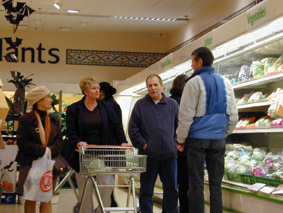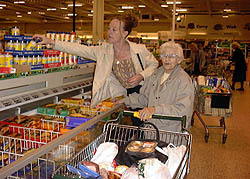
back

|
 |

As Europe Ages, a Grocery Chain Extends a Hand
By Tania Ralli, The New York Times
December 27, 2004
If Walter Fischer forgets to take his glasses when he shops for groceries at the Adeg supermarket on the outskirts of Salzburg, Austria, it is not a problem.
''I don't have to bend down to see the prices on the lower shelves,'' said Mr. Fischer, 48. ''The tags are big enough that the prices are easy to read.'' If he still has trouble, he can borrow a pair of reading glasses from the store or simply reach for one of the magnifying glasses hanging from chains in the grocery aisles and dairy cases.
The Adeg Aktiv Markt 50+ is Europe's first supermarket designed for shoppers over age 50. The labels are big; the aisles are wide; the floors are nonskid, even when wet; and there are plenty of places to sit down.
The market, which opened in May, is the first attempt by Adeg, a subsidiary of the German food company Edeka, to address Europe's most pressing demographic trend: an aging population. The median age in Europe is 37.7, but it is expected to rise to 52.3 by 2050 because of a plummeting birth rate and a longer life expectancy. A quarter of Austrians and a third of Germans are expected to be 60 or older by 2015. In the United States, the population is aging, as well, though not as rapidly as it is in Europe, and the median age of 35 is expected to remain steady over the next 50 years.
Kurt Erlacher, the project manager with Adeg who oversaw creation of the new market, sees some distinct advantages in pursuing the older shopper. ''This group has a lot of buying power,'' said Mr. Erlacher, who is 44. ''They have already paid off their homes and cars. Their children are out of the house. Their disposable income is higher.''
Some of the store's appealing differences, which would hardly surprise American shoppers, are neatly stocked shelves with attractive goods -- a contrast to many European supermarkets where products are slid onto shelves in jagged-edged cardboard trays.
Some of the other changes are more subtle. The lights are specially calibrated to reduce glare on elderly customers' more sensitive eyes. The shelves are lower so products are within easy reach. And in addition to regular shopping carts, there are carts that hook on to wheelchairs and carts that double as seats for the weary -- as soon as a shopper sits down, the wheels lock. There is even a machine to check blood pressure, something a shopper of any age might appreciate after waiting in the checkout line on a Saturday afternoon.
Just because the store's amenities are aimed at older shoppers does not mean the shelves are stocked with incontinence undergarments and soluble fiber products. Anneliese Schilchegger, 50, the store manager, said half of the customers were under 50, a statistic that surprised the company. ''They come because it's friendly and bright,'' she said.
Mr. Erlacher said that many of the innovations were particularly appealing to mothers with children. ''We do not want this to be a supermarket where people say that it's a senior center,'' he said. ''We want young shoppers in addition to older shoppers, but we want to be able to serve the elderly.''
Beate Schlager, 35, regularly shops at Adeg because of the store's wide selection of goods. As she wheeled her daughter Alexandra, 1, around the store, Ms. Schlager said, ''the parking places are wider, so it's easier with children.''

The new store was two years in the making, as Adeg conducted extensive research and surveys with shoppers of all ages, even schoolchildren. One conclusion was that those approaching retirement, as well as current pensioners, did not see themselves as geriatric or incapacitated. ''This group is highly active and mobile,'' Mr. Erlacher said. ''It's not like 20 years ago when people turned 60 and were considered old.''
The first store is somewhat remote, on the outskirts of Salzburg, a site chosen for its proximity to a regional office, not to its customers. After it proved to be a success anyway, an Adeg branch in Vienna was renovated to match the features of the first 50+ store. A third store is to open in January, also in Vienna. Mr. Erlacher also decided to match his target market and his employees, who are all over 50. ''Without workers over the age of 50 this concept would only be worth 50 percent of what it is,'' he said.
The workers are highly motivated, more so than the younger generation because they came of age with a different work ethic, Mr. Erlacher said. ''This is a strength of the older salespeople,'' he said. ''Today, being a salesman is not a dream job, but these people learned to be salespeople 30 or 40 years ago because that was what they wanted to be.''
Mr. Erlacher adopted the idea of hiring older workers from a chain of home improvement stores in Britain called B&Q. He said his staff fell into two categories: women who dropped out of the work force when they had children and middle-age workers who have lost their jobs and have had difficulty finding employment because of their age.
The workers are paid about 10 percent more than their younger counterparts, but the additional cost pays off because there is less turnover. The older workers rarely call in sick, Mr. Erlacher said, and they have a higher regard for the worth of the merchandise.
Mr. Erlacher said Edeka was monitoring Adeg's new stores with an eye to adopting some of the concepts for its older customers.
Adeg, which has more than 900 supermarkets in Austria, strives to be service-oriented because it cannot compete on price with discount chains like
Aldi. According to M+M Planet Retail, a European research firm, Adeg's market share has held steady at about 10 percent over the last two years, placing the company behind its competitors
Rewe, Spar and Aldi.
Adeg also is hoping the stores will appeal to single professionals, who tend not to buy in bulk. It caters to smaller households by offering smaller packages of cheese and other perishable food. Because of that, Mr. Erlanger said, the turnover has increased by 30 percent. ''Our customers are very interested in convenience,'' he said. For a single person, young or old, smaller packages mean less spoilage and waste.
Mr. Erlacher said he thought that by appealing to older shoppers and singles he could capture a larger percentage of the market. In Salzburg, the market share has increased by 5 percent over the company's average and customers are traveling to the store from greater distances.
''50+ must be a store with special service,'' he said. The more comfortable the older shoppers feel, the longer they will linger in the stores. And the longer they stay, the more of they will spend, he reasoned.
''They do not realize the power they have,'' he said.
Copyright © 2002
Global Action on Aging
Terms of
Use | Privacy
Policy | Contact Us
|



